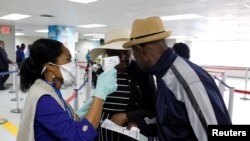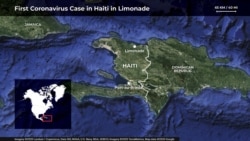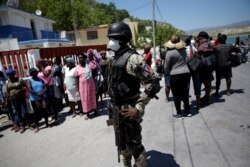When Haitian University professor Bellamy Nelson returned home from a recent trip to the United States, he began to experience flu-like symptoms.
While teaching class Monday afternoon at the Université d'Etat d'Haïti, a state-run university in Limonade in northern Haiti, he felt increasingly ill. Fearing he may have been infected with the coronavirus, Nelson contacted the school administrator and shared his fears. He then headed home to self-quarantine.
The university administrator notified the Public Health Department for the Northeast, the jurisdiction where Nelson lives. Health officials visited the professor at his home and administered a coronavirus test. They advised him to remain quarantined and said his whereabouts would not be publicized to protect his privacy and safety.
Early Thursday on social media and the airwaves, local journalists reported that Nelson had gone into hiding after people armed with machetes attacked the ambulance that was transporting him. They also reported that his coronavirus test had come back negative.
In an interview with VOA Creole, the university administrator denied the account. He said Nelson has remained quarantined and never left his home, making it impossible for him to have been attacked, as was reported. He also said the Health Department was still awaiting the test results.
Nelson is the second suspected coronavirus case in Haiti in a week. Over the weekend, an unidentified woman who had traveled to her native country where the virus has spread exhibited flu-like symptoms and underwent testing for coronavirus. Her test, administered by the national laboratory in Port-au-Prince, came back negative.
Prime Minister Jouthe Joseph announced the results at a press conference. He gave no further details about the woman.
‘Forewarned is forearmed’
Haitians are anxious about the possibility of COVID-19 arriving at their doorstep. Neighboring Dominican Republic has 34 confirmed cases and two deaths.
Despite Public Health Minister Marie Greta Roy Clement’s assurances that the government has been proactive in training medical professionals and informing the public, VOA Creole spoke to many Haitians who said the opposite was true.
Doctors and nurses at state-run General Hospital in Port-au-Prince told VOA Creole they felt extremely vulnerable and afraid because they were uninformed, unprepared and unequipped to handle coronavirus patients.
At a busy downtown market and in the suburb of Petionville, merchants and residents had varying degrees of information about the pandemic. Some people repeated conspiracy theories about rich people planting the virus to kill the poor and reduce the world population, while others believe only people who eat mice, rats and cockroaches can be infected.
Senator Dieudonne Luma Etienne, who represents Haiti’s north in Parliament, said these unfounded rumors worry her.
“Thank God, Haiti has no known cases of coronavirus. But as the proverb says, ‘Forewarned is forearmed,’ ” she told VOA. “And when you are poor, it’s better to invest in prevention than to invest in cures. So we are very worried about the men and women who work at the public markets, because they are at risk.”
The senator participated in a health forum aimed at informing and teaching women and small-business owners about coronavirus prevention.
Haiti stepped up measures this week to try to keep the pandemic out. Its shared border with the Dominican Republic was closed at midnight on March 16 to all traffic except merchandise shipments. Travelers are forced to undergo health screenings in both countries before being allowed entry.
Haiti has also suspended all air travel from Europe and Latin America. Flights to and from the United States are continuing for now, and are under review, the prime minister said. Maritime border patrols have also increased.
Presidential press secretary Eddy Jackson Alexy tweeted Thursday that the Council of Ministers was holding a meeting at the National Palace to discuss additional urgent measures against COVID-19.


